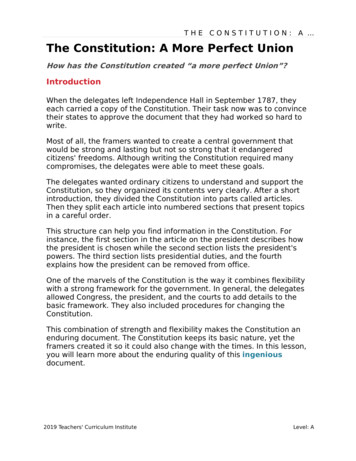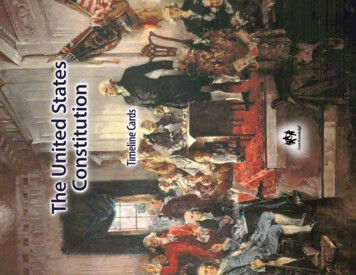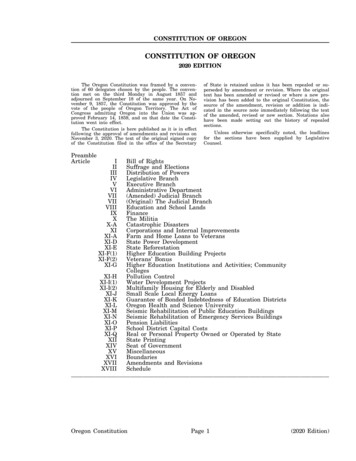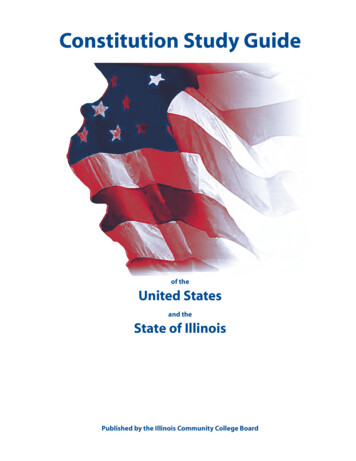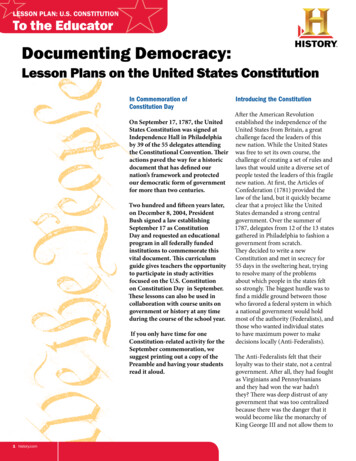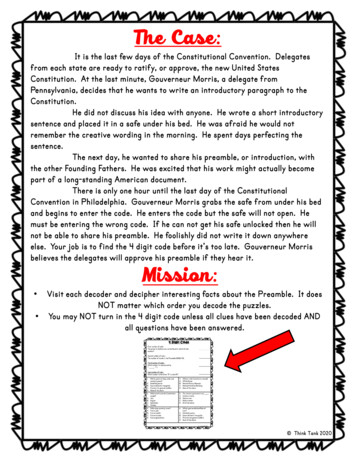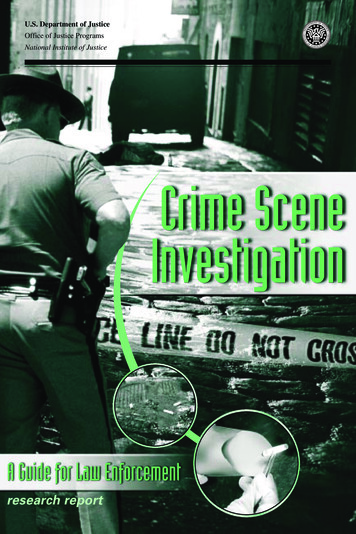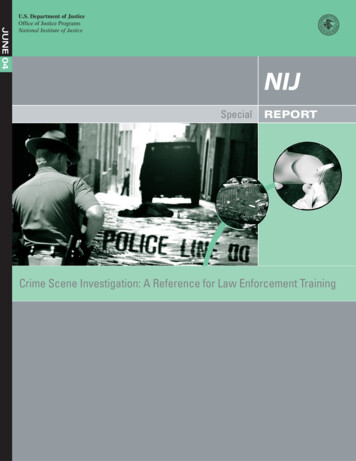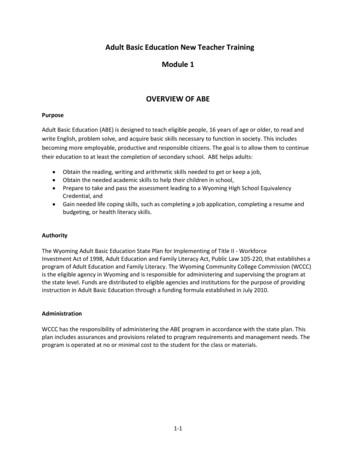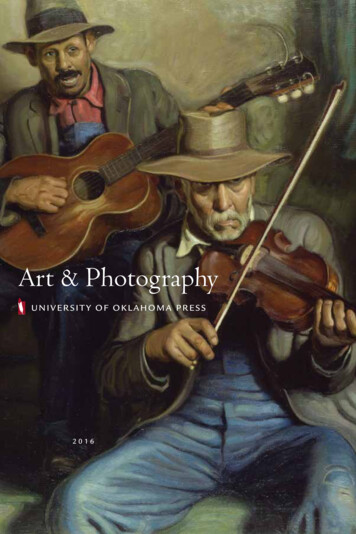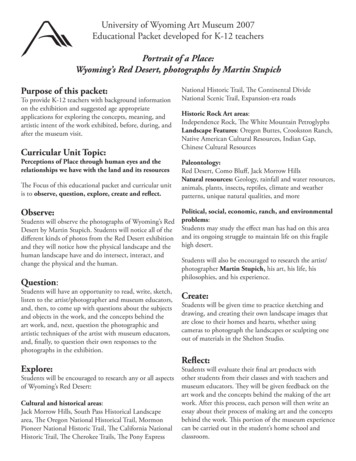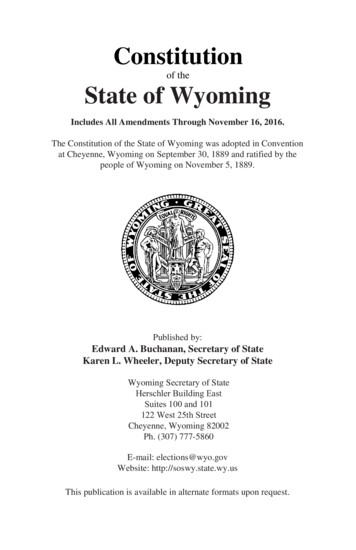
Transcription
Constitutionof theState of WyomingIncludes All Amendments Through November 16, 2016.The Constitution of the State of Wyoming was adopted in Conventionat Cheyenne, Wyoming on September 30, 1889 and ratified by thepeople of Wyoming on November 5, 1889.Published by:Edward A. Buchanan, Secretary of StateKaren L. Wheeler, Deputy Secretary of StateWyoming Secretary of StateHerschler Building EastSuites 100 and 101122 West 25th StreetCheyenne, Wyoming 82002Ph. (307) 777-5860E-mail: elections@wyo.govWebsite: http://soswy.state.wy.usThis publication is available in alternate formats upon request.
A Note from Secretary of State Edward A. BuchananThe Wyoming Constitution is the foundation of Wyoming’s lawsand is our State’s most essential document - preserving our liberty and justicein Wyoming. It was a proclamation of how this newest State, Wyoming,would responsibly protect the values of a rugged frontier when admitted asthe 44th State of the Union on July 10th, 1890.In 1869, Wyoming was only known as a territory, a new one at that.Dreams of statehood began in 1888, but despite petitions to Congress,legislation at the national level failed to garner the necessary support.Regardless, in a lesson of true determination and perseverance, prominentcitizens of the territory decided they would move forward. On September30th, 1889, a draft constitution was finalized and on November 5 th it wasratified by the people of the Wyoming Territory. The Wyoming Constitutionwas ratified by the U.S. Congress on July 10 th, 1890.Unique among state constitutions, 1889 saw the citizen delegates tothe Wyoming Constitutional Convention make the brave and pioneeringdeclaration that women had the right to vote and hold office. This actionforged Wyoming’s place in history as the Equality State. A half-centurylater, the U.S. Constitution followed Wyoming and granted those same rightsthrough the 19th Amendment.Although this document is nearly 128 years old, I find myself inawe that its authors set the course for Wyoming with their understandingthat, to preserve our republic, the responsibility of governance must beplaced in the hands of people, not the government. The contents of thisdocument comprise the essential character of our State and still stand like asentinel to protect the rights of Wyoming’s citizens.As Wyoming’s 22nd Secretary of State, I am proud to publish thisdocument and make it widely available to citizens of Wyoming so thattogether we may better understand our history, our State Constitution, andour responsibility to protect and cherish our State and freedoms.Edward A. BuchananSecretary of StateWritten April 2018
Table of ContentsPREAMBLE. 5ARTICLE 1 . 5ARTICLE 2 . 10ARTICLE 3 . 10ARTICLE 4 . 22ARTICLE 5 . 25ARTICLE 6 . 33ARTICLE 7 . 37ARTICLE 8 . 41ARTICLE 9 . 42ARTICLE 10 . 43ARTICLE 11 . 47ARTICLE 12 . 47ARTICLE 13 . 48ARTICLE 14 . 50ARTICLE 15 . 51ARTICLE 16 . 56ARTICLE 17 . 60ARTICLE 18 . 61ARTICLE 19 . 63ARTICLE 20 . 65ARTICLE 21 . 66
THE GREAT SEALOF THESTATE OF WYOMINGThe two dates on the Great Seal, 1869 and 1890, commemorate theorganization of the Territorial government and Wyoming’s admission intothe Union.The woman in the center holds a banner proclaiming “Equal Rights,”symbolizing Wyoming as the first state to grant equal civil and politicalrights to women. The male figures typify the livestock and mining industriesof the state.Upon a five-pointed star the number “44” appears, being the number ofadmission into the Union. On top of the pillars rest lamps from which burnthe Light of Knowledge. Scrolls encircling the two pillars bear the words“Oil,” “Mines,” “Livestock” and “Grain,” four of Wyoming’s major industries.
PREAMBLECONSTITUTIONof theSTATE OF WYOMING(The boldface type at the beginning of each section is not part of the constitution.)PREAMBLEWe, the people of the State of Wyoming, grateful to God for our civil,political and religious liberties, and desiring to secure them to ourselves andperpetuate them to our posterity, do ordain and establish this Constitution.ARTICLE 1DECLARATION OF RIGHTSSec. 1. Power inherent in the people. All power is inherent in thepeople, and all free governments are founded on their authority, andinstituted for their peace, safety and happiness; for the advancement of theseends they have at all times an inalienable and indefeasible right to alter,reform or abolish the government in such manner as they may think proper.Sec. 2. Equality of all. In their inherent right to life, liberty and thepursuit of happiness, all members of the human race are equal.Sec. 3. Equal political rights. Since equality in the enjoyment ofnatural and civil rights is only made sure through political equality, the lawsof this state affecting the political rights and privileges of its citizens shall bewithout distinction of race, color, sex, or any circumstance or conditionwhatsoever other than individual incompetency, or unworthiness dulyascertained by a court of competent jurisdiction.Sec. 4. Security against search and seizure. The right of thepeople to be secure in their persons, houses, papers and effects againstunreasonable searches and seizures shall not be violated, and no warrant shallissue but upon probable cause, supported by affidavit, particularly describingthe place to be searched or the person or thing to be seized.Sec. 5. Imprisonment for debt. No person shall be imprisoned fordebt, except in cases of fraud.-- 5 --
ARTICLE 1Sec. 6. Due process of law. No person shall be deprived of life,liberty or property without due process of law.Sec. 7. No absolute, arbitrary power. Absolute, arbitrary powerover the lives, liberty and property of freemen exists nowhere in a republic,not even in the largest majority.Sec. 8. Courts open to all; suits against state. All courts shall beopen and every person for an injury done to person, reputation or propertyshall have justice administered without sale, denial or delay. Suits may bebrought against the state in such manner and in such courts as the legislaturemay by law direct.Sec. 9. Trial by jury inviolate. The right of trial by jury shallremain inviolate in criminal cases. A jury in civil cases and in criminal caseswhere the charge is a misdemeanor may consist of less than twelve (12)persons but not less than six (6), as may be prescribed by law. A grand jurymay consist of twelve (12) persons, any nine (9) of whom concurring mayfind an indictment. The legislature may change, regulate or abolish the grandjury system.This section was amended by a resolution adopted by the 1980 legislature, ratifiedby a vote of the people at the general election held on November 4, 1980, and proclaimed ineffect on November 14, 1980.Sec. 10. Right of accused to defend. In all criminal prosecutionsthe accused shall have the right to defend in person and by counsel, todemand the nature and cause of the accusation, to have a copy thereof, to beconfronted with the witnesses against him, to have compulsory processserved for obtaining witnesses, and to a speedy trial by an impartial jury ofthe county or district in which the offense is alleged to have been committed.When the location of the offense cannot be established with certainty, venuemay be placed in the county or district where the corpus delecti [delicti] isfound, or in any county or district in which the victim was transported.This section was amended by a resolution adopted by the 1975 legislature, ratifiedby a vote of the people at the general election held on November 2, 1976, and proclaimed ineffect on November 23, 1976.Sec. 11. Self-incrimination; jeopardy. No person shall becompelled to testify against himself in any criminal case, nor shall anyperson be twice put in jeopardy for the same offense. If a jury disagree, or ifthe judgment be arrested after a verdict, or if the judgment be reversed forerror in law, the accused shall not be deemed to have been in jeopardy.Sec. 12. Detaining witnesses. No person shall be detained as awitness in any criminal prosecution longer than may be necessary to take his-- 6 --
ARTICLE 1testimony or deposition, nor be confined in any room where criminals areimprisoned.Sec. 13. Indictment. Until otherwise provided by law, no personshall, for a felony, be proceeded against criminally, otherwise than byindictment, except in cases arising in the land or naval forces, or in the militiawhen in actual service in time of war or public danger.Sec. 14. Bail; cruel and unusual punishment. All persons shall bebailable by sufficient sureties, except for capital offenses when the proof isevident or the presumption great. Excessive bail shall not be required, norexcessive fines imposed, nor shall cruel or unusual punishment be inflicted.Sec. 15. Penal code to be humane. The penal code shall be framedon the humane principles of reformation and prevention.Sec. 16. Conduct of jails. No person arrested and confined in jailshall be treated with unnecessary rigor. The erection of safe and comfortableprisons, and inspection of prisons, and the humane treatment of prisonersshall be provided for.Sec. 17. Habeas corpus. The privilege of the writ of habeas corpusshall not be suspended unless, when in case of rebellion or invasion thepublic safety may require it.Sec. 18. Religious liberty. The free exercise and enjoyment ofreligious profession and worship without discrimination or preference shallbe forever guaranteed in this state, and no person shall be renderedincompetent to hold any office of trust or profit, or to serve as a witness orjuror, because of his opinion on any matter of religious belief whatever; butthe liberty of conscience hereby secured shall not be so construed as toexcuse acts of licentiousness or justify practices inconsistent with the peaceor safety of the state.Sec. 19. Appropriations for sectarian or religious societies orinstitutions prohibited. No money of the state shall ever be given orappropriated to any sectarian or religious society or institution.Sec. 20. Freedom of speech and press; libel; truth a defense.Every person may freely speak, write and publish on all subjects, beingresponsible for the abuse of that right; and in all trials for libel, both civil andcriminal, the truth, when published with good intent and [for] justifiableends, shall be a sufficient defense, the jury having the right to determine thefacts and the law, under direction of the court.-- 7 --
ARTICLE 1Sec. 21. Right of petition and peaceable assembly. The right ofpetition, and of the people peaceably to assemble to consult for the commongood, and to make known their opinions, shall never be denied or abridged.Sec. 22. Protection of labor. The rights of labor shall have justprotection through laws calculated to secure to the laborer proper rewardsfor his service and to promote the industrial welfare of the state.Sec. 23. Education. The right of the citizens to opportunities foreducation should have practical recognition. The legislature shall suitablyencourage means and agencies calculated to advance the sciences and liberalarts.Sec. 24. Right to bear arms. The right of citizens to bear arms indefense of themselves and of the state shall not be denied.Sec. 25. Military subordinate to civil power; quarteringsoldiers. The military shall ever be in strict subordination to the civil power.No soldier in time of peace shall be quartered in any house without consentof the owner, nor in time of war except in the manner prescribed by law.Sec. 26. Treason. Treason against the state shall consist only inlevying war against it, or in adhering to its enemies, or in giving them aidand comfort. No person shall be convicted of treason unless on the testimonyof two witnesses to the same overt act, or on confession in open court; norshall any person be attained of treason by the legislature.Sec. 27. Elections free and equal. Elections shall be open, free andequal, and no power, civil or military, shall at any time interfere to preventan untrammeled exercise of the right of suffrage.Sec. 28. Taxation; consent of people; uniformity and equality.No tax shall be imposed without the consent of the people or their authorizedrepresentatives.This section was amended by a resolution adopted by the 1988 legislature, ratifiedby a vote of the people at the general election held on November 8, 1988, and proclaimed ineffect on November 21, 1988.Sec. 29. Rights of aliens. No distinction shall ever be made by lawbetween resident aliens and citizens as to the possession, taxation, enjoymentand descent of property.Sec. 30. Monopolies and perpetuities prohibited. Perpetuitiesand monopolies are contrary to the genius of a free state, and shall not be-- 8 --
ARTICLE 1allowed. Corporations being creatures of the state, endowed for the publicgood with a portion of its sovereign powers, must be subject to its control.Sec. 31. Control of water. Water being essential to industrialprosperity, of limited amount, and easy of diversion from its naturalchannels, its control must be in the state, which, in providing for its use, shallequally guard all the various interests involved.Sec 32. Eminent domain. Private property shall not be taken forprivate use unless by consent of the owner, except for private ways ofnecessity, and for reservoirs, drains, flumes or ditches on or across the landsof others for agricultural, mining, milling, domestic or sanitary purposes, norin any case without due compensation.Sec. 33. Compensation for property taken. Private property shallnot be taken or damaged for public or private use without just compensation.Sec. 34. Uniform operation of general law. All laws of a generalnature shall have a uniform operation.Sec. 35. Ex post facto laws; impairing obligation of contracts.No ex post facto law, nor any law impairing the obligation of contracts, shallever be made.Sec. 36. Rights not enumerated reserved to people. Theenumeration in this constitution, of certain rights shall not be construed todeny, impair, or disparage others retained by the people.Sec. 37. Constitution of United States supreme law of land. TheState of Wyoming is an inseparable part of the federal union, and theconstitution of the United States is the supreme law of the land.Sec. 38. Right of health care access.(a) Each competent adult shall have the right to make his or herown health care decisions. The parent, guardian or legal representative ofany other natural person shall have the right to make health care decisionsfor that person.(b) Any person may pay, and a health care provider may accept,direct payment for health care without imposition of penalties or fines fordoing so.(c) The legislature may determine reasonable and necessaryrestrictions on the rights granted under this section to protect the health andgeneral welfare of the people or to accomplish the other purposes set forth inthe Wyoming Constitution.-- 9 --
ARTICLE 2(d) The state of Wyoming shall act to preserve these rights fromundue governmental infringement.Sec. 39. Opportunity to hunt, fish and trap. The opportunity tofish, hunt and trap wildlife is a heritage that shall forever be preserved to theindividual citizens of the state, subject to regulation as prescribed by law,and does not create a right to trespass on private property, diminish otherprivate rights or alter the duty of the state to manage wildlife.ARTICLE 2DISTRIBUTION OF POWERSSec. 1. Powers of government divided into three departments.The powers of the government of this state are divided into three distinctdepartments: The legislative, executive and judicial, and no person orcollection of persons charged with the exercise of powers properly belongingto one of these departments shall exercise any powers properly belonging toeither of the others, except as in this constitution expressly directed orpermitted.ARTICLE 3LEGISLATIVE DEPARTMENTSec. 1. Composition and name of legislature. The legislativepower shall be vested in a senate and house of representatives, which shallbe designated "the legislature of the State of Wyoming."Sec. 2. Members' terms and qualifications. Senators shall beelected for the term of four (4) years and representatives for the term of two(2) years. The senators elected at the first election shall be divided by lot intotwo classes as nearly equal as may be. The seats of senators of the first classshall be vacated at the expiration of the first two years, and of the secondclass at the expiration of four years. No person shall be a senator who hasnot attained the age of twenty-five years, or a representative who has notattained the age of twenty-one years, and who is not a citizen of the UnitedStates and of this state and who has not, for at least twelve months nextpreceding his election resided within the county or district in which he waselected.Sec. 3. Legislative apportionment. Each county shall constitute asenatorial and representative district; the senate and house of representativesshall be composed of members elected by the legal voters of the countiesrespectively, every two (2) years. They shall be apportioned among the said-- 10 --
ARTICLE 3counties as nearly as may be according to the number of their inhabitants.Each county shall have at least one senator and one representative; but at notime shall the number of members of the house of representatives be lessthan twice nor greater than three times the number of members of the senate.The senate and house of representatives first elected in pursuance of thisconstitution shall consist of sixteen and thirty-three members respectively.This section is inconsistent with the application of the “one person, one vote” principle under circumstances as they presently exist in Wyoming. Consequently, the Wyominglegislature may disregard this provision when reapportioning either the senate or the house ofrepresentatives.Sec. 4. Vacancies. [Repealed.]This section was repealed by a resolution adopted by the 1947 legislature, ratifiedby a vote of the people on November 2, 1948, and proclaimed in effect on December 1, 1948.See Art. 3, Sec. 51 for the present constitutional provisions on filling vacancies.Sec. 5. When members elected and terms begin. Members of thesenate and house of representatives shall be elected on the day provided bylaw for the general election of a member of congress, and their term of officeshall begin on the first Monday of January thereafter.Sec. 6. Compensation of members; duration of sessions. Thelegislature shall not meet for more than sixty (60) legislative working daysexcluding Sundays during the term for which members of the house ofrepresentatives are elected, except when called into special session. Thelegislature shall determine by statute the number of days not to exceed sixty(60) legislative working days to be devoted to general and budget session,respectively. The legislature shall meet on odd-numbered years for a generaland budget session. The legislature may meet on even-numbered years forbudget session. During the budget session no bills except the budget bill maybe introduced unless placed on call by a two-thirds vote of either house. Thelegislature shall meet for no more than forty (40) legislative working daysexcluding Sundays in any (1) calendar year, except when called into specialsession. The compensation of the members of the legislature shall be asprovided by law; but no legislature shall fix its own compensation.This section was amended by a resolution adopted by the 1971 legislature, ratifiedby a vote of the people at the general election held on November 7, 1972, and proclaimed ineffect on December 12, 1972.Sec. 7. Time and place of sessions.(a) The legislature shall meet at the seat of government at twelveo'clock noon, on the second Tuesday of January of the odd-numbered yearsfor general and budget session and may meet on the second Tuesday ofJanuary of the even-numbered years for budget session, and at other timeswhen convened by the governor or upon call of the legislature as hereinprovided. The governor by proclamation may also, in times of war or graveemergency by law defined, temporarily convene the legislature at a place or-- 11 --
ARTICLE 3places other than the seat of government. The legislature may convene aspecial session not to last longer than twenty (20) working days as follows:(i) Upon written request to the presiding officer of eachhouse of the legislature by a majority of the elected members ofeach house, the legislature shall convene in special session; or(ii) The presiding officers of each house shall also jointlycall a special session for the purpose of resolving a challenge or adispute of any kind in the determination of the presidential electors.This section was amended by a resolution adopted by the 1961 legislature, ratifiedby a vote of the people at the general election held on November 6, 1962. The 1962 amendmentadded the second sentence to this section.This section was amended again by a resolution adopted by the 1971 legislature,ratified by a vote of the people at the general election held on November 7, 1972, andproclaimed in effect on December 12, 1972.This section was amended again by a resolution adopted by the 2001 legislature,ratified by a vote of the people at the general election held on November 5, 2002 and proclaimedin effect on November 13, 2002.Sec. 8. Members disqualified for other office. No senator orrepresentative shall, during the term for which he was elected, be appointedto any civil office under the state, and no member of congress or other personholding an office (except that of notary public or an office in the militia)under the United States or this state, shall be a member of either house duringhis continuance in office.Sec. 9. Compensation not to be increased during term. Nomember of either house shall, during the term for which he was elected,receive any increase of salary or mileage under any law passed during thatterm.Sec. 10. Presiding officers; other officers; each house to judgeof election and qualifications of its members. The senate shall, at thebeginning and close of each regular session and at such other times as maybe necessary, elect one of its members president; the house of representativesshall elect one of its members speaker; each house shall choose its otherofficers, and shall judge of the election returns and qualifications of itsmembers.Sec. 11. Quorum. A majority of each house shall constitute aquorum to do business, but a smaller number may adjourn from day to day,and compel the attendance of absent members in such manner and under suchpenalties as each house may prescribe.Sec. 12. Rules, punishment and protection. Each house shall havepower to determine the rules of its proceedings, and [to] punish its membersor other persons for contempt or disorderly behavior in its presence; toprotect its members against violence or offers of bribes or private-- 12 --
ARTICLE 3solicitation, and with the concurrence of two-thirds, to expel a member, andshall have all other powers necessary to the legislature of a free state. Amember expelled for corruption shall not thereafter be eligible to eitherhouse of the legislature, and punishment for contempt or disorderly behaviorshall not bar a criminal prosecution for the same offense.Sec. 13. Journals. Each house shall keep a journal of itsproceedings and may, in its discretion, from time to time, publish the same,except such parts as require secrecy, and the yeas and nays on any question,shall, at the request of any two members, be entered on the journal.Sec. 14. Sessions to be open. The sessions of each house and of thecommittee of the whole shall be open unless the business is such as requiressecrecy.Sec. 15. Adjournment. Neither house shall, without the consent ofthe other, adjourn for more than three days, nor to any other place than thatin which the two houses shall be sitting.Sec. 16. Privilege of members. The members of the legislatureshall, in all cases, except treason, felony, violation of their oath of office andbreach of the peace, be privileged from arrest during their attendance at thesessions of their respective houses, and in going to and returning from thesame; and for any speech or debate in either house they shall not bequestioned in any other place.Sec. 17. Power of impeachment; proceedings. The sole power ofimpeachment shall vest in the house of representatives; the concurrence of amajority of all the members being necessary to the exercise thereof.Impeachment shall be tried by the senate sitting for that purpose, and thesenators shall be upon oath or affirmation to do justice according to law andevidence. When the governor is on trial, the chief justice of the supreme courtshall preside. No person shall be convicted without a concurrence of twothirds of the senators elected.Sec. 18. Who may be impeached. The governor and other state andjudicial officers except justices of the peace, shall be liable to impeachmentfor high crimes and misdemeanors, or malfeasance in office, but judgmentin such cases shall only extend to removal from office and disqualificationto hold any office of honor, trust or profit under the laws of the state. Theparty, whether convicted or acquitted, shall, nevertheless, be liable toprosecution, trial, judgment and punishment according to law.Sec. 19. Removal of officers not subject to impeachment. Exceptas hereafter provided, all officers not liable to impeachment shall be subject-- 13 --
ARTICLE 3to removal for misconduct or malfeasance in office as provided by law. Anyperson appointed by the governor to serve as head of a state agency, ordivision thereof, or to serve as a member of a state board or commission,may be removed by the governor as provided by law.This section was amended by a resolution adopted by the 1985 legislature, ratifiedby a vote of the people at the general election held on November 4, 1986, and proclaimed ineffect on November 18, 1986.Sec. 20. Laws to be passed by bill; alteration or amendment ofbills. No law shall be passed except by bill, and no bill shall be so altered oramended on its passage through either house as to change its originalpurpose.Sec. 21. Enacting clause of law. The enacting clause of every lawshall be as follows: "Be it Enacted by the Legislature of the State ofWyoming."Sec. 22. Limitation on time for introducing bill forappropriation. No bill for the appropriation of money, except for theexpenses of the government, shall be introduced within five (5) days of theclose of the session, except by unanimous consent of the house in which it issought to be introduced.Sec. 23. Bill must go to committee. No bill shall be considered orbecome a law unless referred to a committee, returned therefrom and printedfor the use of the members.Sec. 24. Bill to contain only one subject, which shall beexpressed in title. No bill, except general appropriation bills and bills forthe codification and general revision of the laws, shall be passed containingmore than one subject, which shall be clearly expressed in its title; but if anysubject is embraced in any act which is not expressed in the title, such actshall be void only as to so much thereof as shall not be so expressed.Sec. 25. Vote required to pass bill. No bill shall become a lawexcept by a vote of a majority of all the members elected to each house, norunless on its final passage the vote taken by ayes and noes, and the names ofthose voting be entered on the journal.Sec. 26. How laws revised, amended or extended. No law shallbe revised or amended, or the provisions thereof extended by reference to itstitle only, but so much thereof as is revised, amended, or extended, shall bere-enacted and published at length.-- 14 --
ARTICLE 3Sec. 27. Special and local laws prohibited. The legislature shallnot pass local or special laws in any of the following enumerated cases, thatis to say: For granting divorces; laying out, opening, altering or workingroads or highways; vacating roads, town plats, streets, alleys or publicgrounds; locating or changing county seats; regulating county or townshipaffairs; incorporation of cities, towns or villages; or changing
when in actual service in time of war or public danger. Sec. 14. Bail; cruel and unusual punishment. All persons shall be bailable by sufficient sureties, except for capital offenses when the proof is evident or the presumption great. Excessive bail shall not be required, nor excessive fines imposed, nor shall cruel or unusual punishment be .

